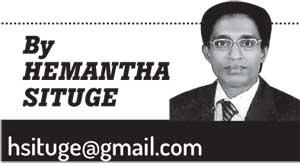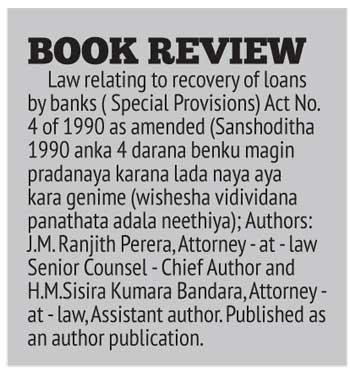RAre Book on recovery law
Undoubtedly the book would serve as a vade mecum for a wide array of readership
Path-breaking opus is not a mere book it is an eminent commentary/study on the subject
The splendid book entitled: Law Relating To Recovery Of Loans By Banks (Special Provisions) Act No. 4 Of 1990 As Amended (Sanshoditha 1990
 Anka 4 Darana Benku Magin Pradanaya Karana Lada Naya Aya Kara Genime (Wishesha Vidividana Panathata Adala Neethiya) written in Sinhalesewas released recently.
Anka 4 Darana Benku Magin Pradanaya Karana Lada Naya Aya Kara Genime (Wishesha Vidividana Panathata Adala Neethiya) written in Sinhalesewas released recently.
It was way back in the year of 1938 that first book of the law in the Sinhalese language emerged entitled: ‘My Lawyer’ (Magé Neethgnayâ) written by B. J. Fernando a then Proctor of the Supreme Court of Ceylon. This book ran into several editions; in 1939 the second edition, the third edition in 1950 revised fourth edition was done by his wife Lakshmi Fernando a Proctor of the SC with a forward written by Dr Colvin R. de Silva, that eminent Advocate of the day. The book is now unheard and unknown apparently buried in the whirligig of time.
However, this was not the first occasion that law was made known to the public in the Sinhalese language. Advocate Herbert Sri Nissanka later King’s Counsel pioneered in releasing a Sinhalese journal entitled: Raja Niti (Raja Neethi) in 1925 where extracts of some of the statutes were translated into the Sinhalese language.
There was phrase coined in the legal arena as “like Silindhu” that in the double murder committed by villager Silindhu-- aptly based for the Bloomsbury Group English novel Beddegama by Leonard Woolf, that well known Colonial Civil Servant,--- stood at the Defendants dock mum, were unable to understand the happening of the Court of law where he was unaware of the procedure that he was sentenced to death. Though the Extraordinary Gazette bearing No. 1/6 dated 07th September 1978 it was allowed the use of English Language to maintain any record and conduct in any court of law in the country. The books in Sinhalese and Tamil languages have since Sri Lanka was made a Republic it became a sine qua non in our original courts of law. The reviewer finds a large number of Sinhalese law books are released day by day. Some of these books are written by Attorneys-at-Law and laymen alike. But how many of these books are written by legal practitioners.
This reviewer is of the fervent opinion that most of these books are mere compendiums. How many of these could make an impact on the legal system of the country? J. M. Ranjith Perera a Senior Counsel – a busy eminent practitioner in law ably assisted by H. M. Sisira Kumar Bandara Attorney-at-Law has filled the void that hitherto existed on one of the most abstruse parts of civil law namely the Law Relating to Debt Recovery (Special Provisions) No. 4 of 1990 as amended.
"The opus contains eight chapters. The first chapter deals on the history of parate execution. The second chapter is on the intention of the legislature. On careful perusal, it is evident that the rest of the six chapters are on the procedural aspects the book is a sine qua non a much awaited ‘nuggets of gold’ for the legal profession"
His path-breaking opus is not a mere book it is an eminent commentary/ study on the subject
It was Lord Justice Eldon once who said that: “A Lawyer should live like a hermit and work like
a horse “.
How many senior practitioners of the unofficial bar have imparted their knowledge of the practical law for the benefit of the present and the future generations of our country? The release of this book sequel to the first book titled:
“Law Relating to Debt Recovery Act No 2 of 1990” was written in Sinhalese. J.M. Ranjith Perera Senior Counsel and his Assistant Sisira Kumara Bandara has rendered yeoman services by using their wealth of knowledge for the benefit of the lawyers and the students by expending their time and energy to guide them for a sound knowledge on the subject.
It was the legendary Abraham Lincoln who once said: “A Lawyer’s Time and Advice are His Stock
in Trade “.
The country and the legal profession owe a debt of gratitude to Senior Counsel J M Ranjith Perera and his assistant H M Sisira Kumara Bandara for spearheading to release a series of books to educate the lawyers and laymen alike as they are indeed gems of wisdom to the legal profession and to the people of all walks of life alike. The reviewer learns that these books of these writers would be translated to the Tamil language to help the Tamil medium lawyers and the students shortly.
The reviewer finds a large number of Sinhalese law books are released day by day. Some of these books are written by Attorneys-at-Law and laymen alike. But how many of these books are written by legal practitioners. This reviewer is of the fervent opinion that most of these books are mere compendiums. How many of these could make an impact on the legal system of the country?
The opus contains eight chapters. The first chapter deals on the history of parate execution. The second chapter is on the intention of the legislature. On careful perusal, it is evident that the rest of the six chapters are on the procedural aspects the book is a sine qua non a much awaited ‘nuggets of gold’ for the legal profession.

"The reviewer finds a large amount of Sinhalese law books are released day by day. Some of these books are written by Attorneys-at-Law and laymen alike. But how many of these books are written by legal practitioners. This reviewer is of the fervent opinion that most of these books are mere compendiums. How many of these could make an impact on the legal system of the country?"
J. M. Ranjith Perera a Senior Counsel – a busy eminent practitioner in law ably assisted by H. M. Sisira Kumar Bandara Attorney-at-Law has filled the void that hitherto existed on one of the most abstruse parts of civil law namely the Law Relating to Debt Recovery (Special Provisions) No. 4 of 1990 as amended. Their path-breaking opus on this statute is not a mere book it is an eminent commentary/treatise/study guide on the subject.
The reviewer read and re-read this indispensable book, found replete with thirty-eight reported and six unreported judgments pronounced by the superior Courts with an easy reference index guide culled with pertinent extracts of the Sinhalese statute and more appropriately from the English statute.
The book spans into 228 pages of pure bliss for the legal practitioner. The book contains two extracts from Hansards of the Parliament on the 1990 and 2003 bills and the debates that took place therein are found and where there were hue and outcry from the members of the Parliament introducing this statute was a draconian piece of legislation.
Senior Counsel J. M. Ranjith Perera’s treatise on ‘Law Relating to Debt Recovery Act No. 4 of 1990 as Amended’ has blazed the trail by his maiden book on this statute in not only educating the layman, law students and further for the busy legal practitioners; this reviewer advocates that the opus would be an essential guide. Undoubtedly the book would serve as a vade mecum for all this wide array of readership.
No comments:
Post a Comment